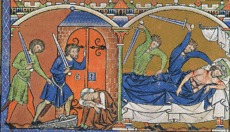Ish-bosheth facts for kids
Quick facts for kids Ish-bosheth |
|
|---|---|

Illustration from the Morgan Bible depicting the death of Ish-bosheth
|
|
| King of Israel | |
| Predecessor | Saul |
| Successor | David |
| House | House of Saul |
| Father | Saul |
Ish-bosheth (also called Eshbaal) was, according to the Hebrew Bible, the second king of the Kingdom of Israel. His name Ish-bosheth means "man of shame" in Hebrew. He was also known as Eshbaal, which means "man of Baal". After his father, King Saul, died, Ish-bosheth became king and ruled for two years.
During his time as king, Ish-bosheth was in a long conflict with David. David had been chosen to be the next king by the Tribe of Judah. This rivalry between Ish-bosheth and David shaped the kingdom's politics. The Bible says Ish-bosheth's rule was filled with war against David's army. Both sides fought for control and to be seen as the rightful leaders. The Bible also tells us that two of Ish-bosheth's own army captains, Baanah and Rechab, killed him. They thought this would make David happy. This act ended Ish-bosheth's rule and helped unite the kingdom under David.
Contents
Becoming King and War with David
After King Saul and his brothers died in the battle of Gilboa, Abner, who was the captain of Saul's army, made Ish-bosheth king. This happened in a place called Mahanaim in Transjordan. Ish-bosheth was 40 years old when he became king and ruled for two years.
However, after King Saul's death, the tribe of Judah chose David as their king. This started a war between Ish-bosheth's followers and David's supporters. David's side eventually started winning against Ish-bosheth's forces. The war continued until Abner decided to join David.
Before Saul died, David had been married to Saul's daughter Michal. She was Ish-bosheth's sister. But Saul and David had a disagreement, and Saul gave Michal to another man. Later, when the war with Ish-bosheth was ending, David said he would only make peace if Michal was returned to him. Ish-bosheth agreed to this. After Abner died, Ish-bosheth seemed to lose hope of staying in power.
Ish-bosheth's Death
Two of Ish-bosheth's own army captains, Rechab and Baanah, killed him. They expected David to reward them for this act. However, David did not approve of this betrayal. He refused to praise them for what was considered a serious crime against a king. Instead, David had both killers executed. Their hands and feet were cut off as punishment. David's supporters then buried Ish-bosheth's head in Abner's grave in Hebron.
About His Names
Ish-bosheth was known by two different names in the Bible. In the Books of Samuel, he is always called Ish-bosheth. This name means "Man of shame" in Hebrew.
However, in the Books of Chronicles, he is always called Eshbaal. This name means "Baal exists" or "fire of Baal." Scholars believe that the name "Bosheth" was used instead of "Ba'al" because the word "Ba'al" later became a word people avoided saying.
Archaeological Discovery
In 2012, archaeologists found a 3,000-year-old writing on a broken ceramic jar. This jar was discovered at a place called Khirbet Qeiyafa. The writing on it included the name "Eshbaal ben Beda." Even though this Eshbaal was not the same person as the king Ish-bosheth/Eshbaal from the Bible, it was the first time this name had been found in an ancient writing. It is one of only four Hebrew writings ever found that date back to the 10th century BC.
 | John T. Biggers |
 | Thomas Blackshear |
 | Mark Bradford |
 | Beverly Buchanan |

